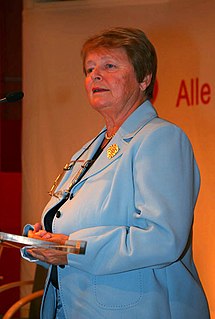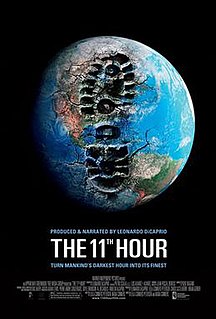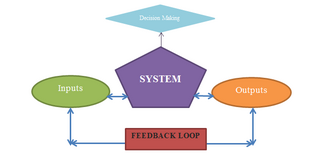
Sustainable development is an organizing principle for meeting human development goals while simultaneously sustaining the ability of natural systems to provide the natural resources and ecosystem services on which the economy and society depend on. The desired result is a state of society where living conditions and resources are used to continue to meet human needs without undermining the integrity and stability of the natural system. Sustainable development can be defined as development that meets the needs of the present without compromising the ability of future generations to meet their own needs.

Human ecology is an interdisciplinary and transdisciplinary study of the relationship between humans and their natural, social, and built environments. The philosophy and study of human ecology has a diffuse history with advancements in ecology, geography, sociology, psychology, anthropology, zoology, epidemiology, public health, and home economics, among others.

Ecological economics, bioeconomics, ecolonomy, eco-economics, or ecol-econ is both a transdisciplinary and an interdisciplinary field of academic research addressing the interdependence and coevolution of human economies and natural ecosystems, both intertemporally and spatially. By treating the economy as a subsystem of Earth's larger ecosystem, and by emphasizing the preservation of natural capital, the field of ecological economics is differentiated from environmental economics, which is the mainstream economic analysis of the environment. One survey of German economists found that ecological and environmental economics are different schools of economic thought, with ecological economists emphasizing strong sustainability and rejecting the proposition that physical (human-made) capital can substitute for natural capital.
Overconsumption describes a situation where the use of a natural resource has exceeded the sustainable capacity of a system. A prolonged pattern of overconsumption leads to the eventual loss of resource bases. The term overconsumption is quite controversial in use and does not necessarily have a single unifying definition. Overconsumption is driven several factors of the current global economy, including forces like consumerism, planned obsolescence, and other unsustainable business models and can be contrasted with sustainable consumption.

William Ernest McKibben is an American environmentalist, author, and journalist who has written extensively on the impact of global warming. He is the Schumann Distinguished Scholar at Middlebury College and leader of the climate campaign group 350.org. He has authored a dozen books about the environment, including his first, The End of Nature (1989), about climate change.

The Brundtland Commission, formerly the World Commission on Environment and Development, was a sub-organization of the United Nations (UN) that aimed to unite countries in pursuit of sustainable development. It was founded in 1983 when Javier Pérez de Cuéllar, the Secretary-General of the United Nations, appointed Gro Harlem Brundtland, former Prime Minister of Norway, as chairperson of the commission. Brundtland was chosen due to her strong background in the sciences and public health.

A steady-state economy is an economy made up of a constant stock of physical wealth (capital) and a constant population size. In effect, such an economy does not grow in the course of time. The term usually refers to the national economy of a particular country, but it is also applicable to the economic system of a city, a region, or the entire world. Early in the history of economic thought, classical economist Adam Smith of the 18th century developed the concept of a stationary state of an economy: Smith believed that any national economy in the world would sooner or later settle in a final state of stationarity.

Lester Russel Brown is a United States environmental analyst, founder of the Worldwatch Institute, and founder and former president of the Earth Policy Institute, a nonprofit research organization based in Washington, D.C. BBC Radio commentator Peter Day referred to him as "one of the great pioneer environmentalists."

Human overpopulation is the concept of a human population becoming too large to be sustained by its environment or resources in the long term. The idea is usually discussed in the context of world population, though it may also concern regions. Human population growth has increased in recent centuries due to medical advancements and improved agricultural productivity. Those concerned by this trend argue that it results in a level of resource consumption which exceeds the environment's carrying capacity, leading to population overshoot. The concept is often discussed in relation to other population concerns such as demographic push and depopulation, as well as in relation to resource depletion and the human impact on the environment.
Bright green environmentalism is an ideology based on the belief that the convergence of technological change and social innovation provides the most successful path to sustainable development.
Resource refers to all the materials available in our environment which help us to satisfy our needs and wants. Resources can broadly be classified upon their availability — they are classified into renewable and non-renewable resources. They can also be classified as actual and potential on the basis of the level of development and use, on the basis of origin they can be classified as biotic and abiotic, and on the basis of their distribution, as ubiquitous and localised. An item becomes a resource with time and developing technology. The benefits of resource utilization may include increased wealth, proper functioning of a system, or enhanced well-being. From a human perspective, a natural resource is anything obtained from the environment to satisfy human needs and wants. From a broader biological or ecological perspective, a resource satisfies the needs of a living organism.

The 11th Hour is a 2007 documentary film on the state of the natural environment created, produced, co-written and narrated by Leonardo DiCaprio. It was directed by Leila Conners Petersen and Nadia Conners and financed by Adam Lewis and Pierre André Senizergues, and distributed by Warner Independent Pictures.

Regenerative design is a process-oriented whole systems approach to design. The term "regenerative" describes processes that restore, renew or revitalize their own sources of energy and materials. Regenerative design uses whole systems thinking to create resilient and equitable systems that integrate the needs of society with the integrity of nature.
Degrowth is a term used for both a political, economic, and social movement as well as a set of theories that critiques the paradigm of economic growth. It is based on ideas from a diverse range of lines of thought such as political ecology, ecological economics, feminist political ecology, and environmental justice, pointing out the social and ecological harm caused by the pursuit of infinite growth and Western "development" imperatives. Degrowth emphasizes the need to reduce global consumption and production and advocates a socially just and ecologically sustainable society with social and environmental well-being replacing GDP as the indicator of prosperity. Hence, although GDP is likely to shrink in a "Degrowth society", i.e. a society in which the objectives of the Degrowth movement are achieved, this is not the primary objective of Degrowth.

Sustainability is the capacity to endure in a relatively ongoing way across various domains of life. In the 21st century, it refers generally to the capacity for Earth's biosphere and human civilization to co-exist. Sustainability has also been described as "meeting the needs of the present generation without compromising the ability of future generations to meet their needs". For many, sustainability is defined through the interconnected domains of environment, economy and society. Sustainable development, for example, is often discussed through the domains of culture, technology economics and politics.
Sustainability measurement is the quantitative basis for the informed management of sustainability. The metrics used for the measurement of sustainability are still evolving: they include indicators, benchmarks, audits, sustainability standards and certification systems like Fairtrade and Organic, indexes and accounting, as well as assessment, appraisal and other reporting systems. They are applied over a wide range of spatial and temporal scales.
Post Carbon Institute (PCI) is a think tank which provides information and analysis on climate change, energy scarcity, and other issues related to sustainability and long term community resilience. Its Fellows specialize in various fields related to the organization's mission, such as fossil fuels, renewable energy, food, water, and population. Post Carbon is incorporated as a 501(c)3 non-profit organization and is based in Corvallis, Oregon, United States.
The history of sustainability traces human-dominated ecological systems from the earliest civilizations to the present day. This history is characterized by the increased regional success of a particular society, followed by crises that were either resolved, producing sustainability, or not, leading to decline. In early human history, the use of fire and desire for specific foods may have altered the natural composition of plant and animal communities. Between 8,000 and 10,000 years ago, agrarian communities emerged which depended largely on their environment and the creation of a "structure of permanence."
Daniel C. Taylor is an American scholar and practitioner of social change, with notable achievements in community-led conservation and global education. He also recognized as giving a definitive explanation for the century-old Yeti or Abominable Snowman) mysteries.
Ecopreneurship is a term coined to represent the process of principles of entrepreneurship being applied to create businesses that solve environmental problems or operate sustainably. The term began to be widely used in the 1990s, and it is otherwise referred to as "environmental entrepreneurship." In the book Merging Economic and Environmental Concerns Through Ecopreneurship, written by Gwyn Schuyler in 1998, ecopreneurs are defined as follows:
"Ecopreneurs are entrepreneurs whose business efforts are not only driven by profit, but also by a concern for the environment. Ecopreneurship, also known as environmental entrepreneurship and eco-capitalism, is becoming more widespread as a new market-based approach to identifying opportunities for improving environmental quality and capitalizing upon them in the private sector for profit. "










